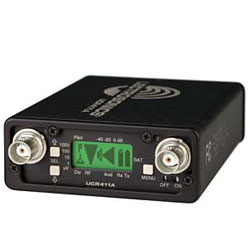|
ASC (Canada) Ltd. Phone: 416-251-5409 Sales Rentals Service Carts & Custom Work Specials Consignment Used Goods Downloads Links Contact Us |
|
UCR 411a
The native, compandor-free Digital Hybrid operating mode works with all Lectrosonics hybrid transmitters. DSP "compatibility modes" allow the receiver to also work with companded analog transmitters from Lectrosonics and some from other manufacturers. This expands the usefulness of the receiver and provides the backward compatibility needed to give existing customers an economical upgrade path. The interface for setting up and operating the UCR411A receiver is an LCD display and three switches on the front panel of the receiver. All information regarding the status of audio and RF signals and battery levels in the receiver and the transmitter are simultaneously shown in the Main Window of the display. A "locked" operating mode can be enabled by holding the MENU button down for several seconds. In this mode no changes can be made to the settings already stored, and the scanning mode cannot be entered. A special scanning mode is provided to conduct RF site surveys and locate clear operating frequencies. A scrollable window provides a graphical illustration of RF signals (interference) within the tuning range of the receiver. The receiver operates from external DC or internal 9 volt batteries. The battery door rotates around the XLR audio output jack, remaining attached to the receiver at all times. All parts are made of machined aluminum to endure the rigors of field production. Protection against inserting the batteries backwards into the battery compartment is provided by both mechanical barriers and circuitry to prevent damage that might be caused by reverse polarity. The housing is coated with an electrostatic powder coat finish and the battery door is anodized. Nomenclature is laser etched into the finishes for legibility and durability. Digital Hybrid Wireless® is a revolutionary new design that combines digital audio with an analog FM radio link to provide outstanding audio quality and the exemplary RF performance of the finest analog wireless systems. This overcomes channel noise in a dramatically new way, digitally encoding the audio in the transmitter and decoding it in the receiver, yet still sending the encoded information via an analog FM wireless link. This proprietary algorithm is not a digital implementation of an analog compandor. Instead, it is a technique which can be accomplished only in the digital domain. The process eliminates compandor artifacts, expanding the applications to include test and measurement of acoustic spaces and musical instruments.
Block 470 470.100 - 495.600 Block 19 486.400 - 511.900 Block 20 512.000 - 537.500 Block 21 537.600 - 563.100 Block 22 563.200 - 588.700 Block 23 588.800 - 607.900 and 614.100 - 614.300 Block 24 614.400 - 639.900 Block 25 640.000 - 665.500 Block 26 665.600 - 691.100 Receiver Type: Triple conversion; superhet IF frequencies: 244 MHz, 10.7 MHz and 300 kHz Frequency Stability: ±0.001 % Front end bandwidth: ±5.5 MHz, @ -3 dB Sensitivity: 20 dB Sinad: 0.9 uV (-108 dBm), A weighted, 60 dB Quieting: 1.12 uV (-105 dBm), A weighted AM rejection: >60 dB, 2 uV to 1 Volt Modulation acceptance: 85 kHz Image and spurious rejection: 85 dB Third order intercept: +8 dBm Diversity method: Phased antenna SmartDiversityTM FM Detector: Digital pulse counting detector operating at 300 kHz Antenna inputs: Dual BNC female jacks; 50 Ohm impedance Audio output: Rear panel XLR connector; can drive 600 Ohm, adjustable from -50 to +5 dBu in 1 dB steps (into nominal 10 k bal. load) Frequency Response: 32 Hz to 20 kHz (± dB) THD: 0.2% (typical) Input Dynamic Range: 125 dB (with full Tx limiting) Overall Latency (time delay): 3mS Audio Test Tone: 1 KHz, -50 to +5 dBu, <1%THD Front Panel Controls and Indicators: LCD display, Menu - up/down buttons, Power switch Rear Panel Features: XLR audio output jack, External DC input, Battery compartment External Power: Minumum 10 Volts to maximum 18 VDC, 1.6 W; 170 mA at 12 VDC Battery Life: 6 to 8 hrs. continuous, w/ two alkaline 9 V batteries; up to 20 hrs. continuous w/ two lithium 9 V batteries Weight: 15.2 ozs. (with two alkaline 9V batteries) Dimensions: 3.23" wide x 1.23" high x 4.75" deep Specifications subject to change without notice. |
